Table of Contents
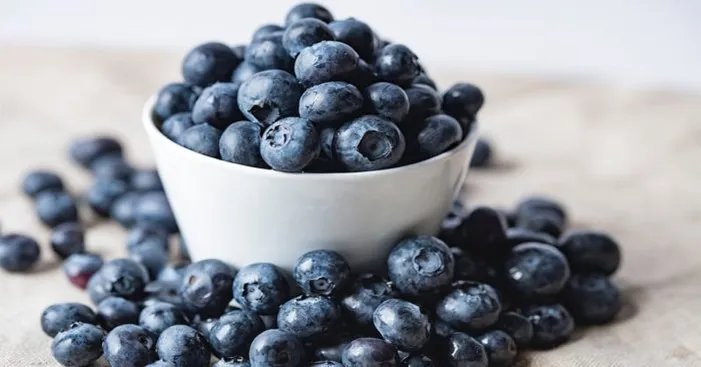
Blueberries carbs is a general term most people use to learn about the different nutritional values of these amazing fruits.
This fruit belongs to the Ericaceae family and is praised for its vibrant blue color and refreshing tangy taste. (1)
Also, blueberries are very versatile as they can be used as an ingredient in both savory and sweet dishes.
The blueberry is the “king of antioxidants” not only because of the little crown shape it has on top but also because of its beneficial nutrients.
In this article, you will learn about blueberries carbs and how they are different from fresh to frozen or canned blueberries, you will also learn about the nutrients in blueberries and their health benefits alongside some tips on how to buy, consume & store these refreshing fruits.
Blueberries carbs:

These natural snacks have a very rich nutritional composition which helps protect our bodies from various diseases.
Blueberries carbs offer many micro-nutrients including dietary fibers, sugar, carbs, and vitamins A, B, C, E, and K.
They also offer many minerals such as calcium, magnesium, phosphorus, potassium …
Blueberries are full of carbohydrates but this is not necessarily bad as we also need a daily supply of this type of nutrients.
Once we consume carbohydrates, our bodies start turning them into glucose which is the main source of energy for each and every cell. (2)
With a proper glucose level in the system, the body is more capable of carrying out daily activities and less vulnerable to fatigue.
Another type of carbs from blueberries is dietary fibers which have no calories nor energy but they are essential for a healthy digestive process.
Daily carbs requirement:

Despite the bad reputation we got about carbs, they still need to make up for a certain percentage of the daily calorie intake.
To be specific, between 45 and 65% of our daily caloric intake must be from carbohydrates according to some research. (3)
This means that for a classic diet of 2000 calories we need to eat anywhere between 225g and 325g of carbohydrates.
Blueberries carbs: fresh blueberries
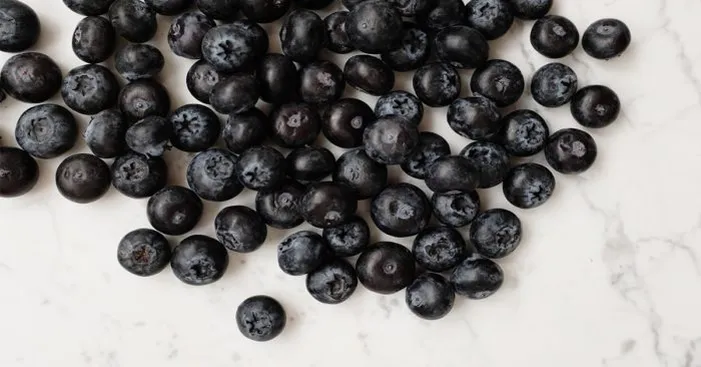
The amount of carbohydrates in blueberries usually depends on the way they are processed.
With a recommended serving of 75g (1/2 cup) of fresh blueberries, we get 42 calories of which up to 90% come from carbohydrates.
In other words, we get about 10g of carbohydrates by eating half a cup (75g or 100 fruits) of fresh blueberries and that represents about 5% of the daily needs.
Blueberries carbs: Canned blueberries

As the least preferred processing type, canned blueberries tend to have a lot of added sugars which raise the caloric value of these fruits. (4)
For instance, with ½ cup of canned blueberries in heavy syrup you get 170 calories and that is the highest compared to other fresh or frozen blueberries.
As for carbs, they offer about 45g of carbohydrates, 32g of sugars, and 7.3g of fibers which is the highest among other processed blueberries.
Blueberries carbs: frozen blueberries
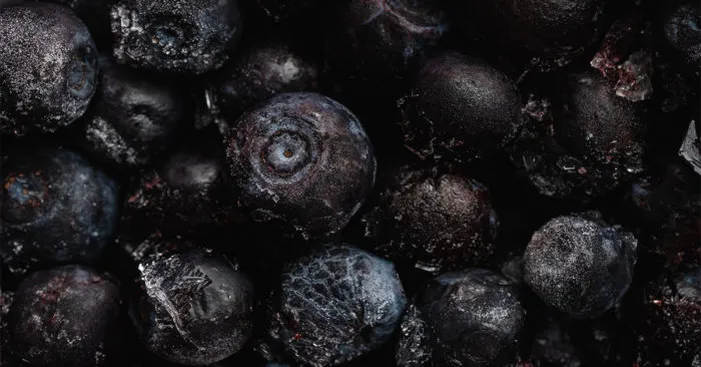
Even though fresh fruits are always a better option, sometimes the only choice we have in the market is that of frozen ones.
Especially during winters when it’s not yet the season of blueberries maturity, frozen blueberries are the only ones we can get. (5)
This doesn’t mean the freezing process degrades the nutritional composition of this fruit, but it does slightly change it.
In fact, frozen blueberries tend to have more added sugar mainly in the form of sucrose in order to protect them from spoiling.
A serving of 115g (1/2 cup) of frozen blueberries provides about 100 calories among which 25g of carbohydrates (10%) and 22.5g (70%) of sugar.
In addition, the same amount of frozen blueberries offers about 2.5g of fibers and that is almost 10% of our daily needs.
Nutrients in blueberries carbs:

Blueberries are the main ingredient of many pastry and dessert recipes and that is because of their delicious taste and astonishing color.
These fruits also boost the overall heart health and brain functioning and many other body functions.
In addition, blueberries carbs contain natural nutrients that can protect the eyes from infections.
These are some of the many benefits that come with this fruit and they are the result of rich nutritional composition that includes:
Vitamins and minerals:
Half a cup of blueberries contains about 12% of the daily need in vitamin C and 18% of the needs in vitamin K alongside 12% of what we need in manganese.
The vitamin content of blueberries is not abundant but it’s diverse and offers a little bit of everything.
For instance, 74g of blueberries offer about 220mg of minerals which is very modest but still very varied.
Potassium is the most abundant mineral in blueberries carbs with small amounts of magnesium, calcium, manganese, iron, zinc … (6)
As for the vitamin content, these fruits provide small amounts of vitamin A, E, and B group vitamins.
Powerful antioxidant properties:
Generally speaking, antioxidants provide us with protection from free radicals which damages and degrade our health.
Specialists believe that blueberries are one of the top antioxidant sources among all vegetables and fruits. (7)
Blueberries carbs offer antioxidants in the form of vitamin E, vitamin A, flavonoids (mostly anthocyanins) which have many health benefits.
Flavonoids are plant pigments that give flowers, vegetables, and fruits their colors.
These plant components are not only there to decorate but also to provide protection from various pathogens that could harm the plant. (8)
In fact, they play the main role in defining the taste of a specific vegetable or fruit as they mainly add an acidic tangy flavor.
Polyphenols are also a very famous ingredient in the pharmaceutical industry to add to the medical properties of a specific drug.
Blueberries carbs are a great source of flavonoids in the form of anthocyanin including cyanidin (blue), delphinidin (red + blue), and malvidin (purple).
Benefits of blueberries carbs:
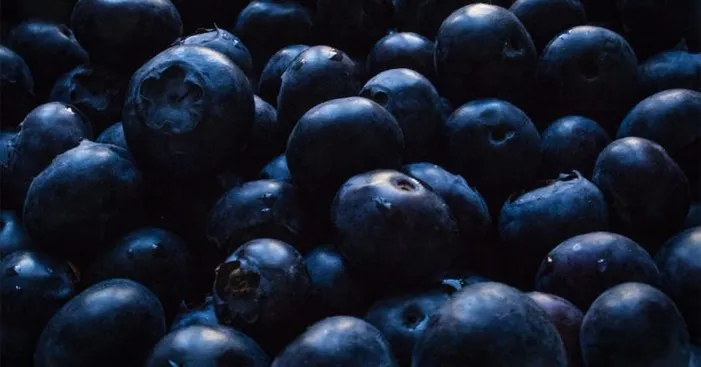
Cancer prevention:
Vitamin A, anthocyanins and tannic acid in blueberries carbs can act on the growth of already existing tumor cells.
These antioxidants may reduce the oxidative stress caused by the presence of free radicals which can reduce the risk of cancer.
Among the types of cancer that blueberries may prevent we mention liver, ovary, breast, prostate, and colon cancers. (9)
In fact, these antioxidants act on DNA damage which could slow the process of aging or the risk of some cells becoming cancerous.
Supports brain health:
Thanks to its richness in antioxidants, consuming blueberries regularly help supply the brain with the amount of oxygen it needs.
People who consume blueberries often usually have a better memory and are even less vulnerable to neurological diseases including Alzheimer’s, dementia, and Parkinson’s.
According to animal studies. Blueberries antioxidants act on the parts of the brain responsible for our intelligence. (10)
Apparently, it increases the neurological transmission to certain affected areas which helps stimulate them.
Another human study on 9 old humans that already suffer from low cognition ability shows better brain function after consuming blueberries juice daily for 12 weeks. (11)
Good for the kidneys and urinary system:
UTIs or infections in the urinary system is a very common case and blueberries show great results facing these health issues. (12)
These fruits offer anti-adhesives, compounds that can prevent bacteria such as E.coli from sticking to the bladder wall and causing infection.
It should be noted that no mainstream studies are confirming the efficiency of blueberries in fighting UTIs.
However, there are studies made on close relatives of blueberries including “cranberries” and they show great results in fighting UTIs.
Nourishes the skin:
Regular consumption of ½ cup (74g) of blueberries may have a good influence on the skin as it can:
Boost the collagen content:
Some studies prove the effectiveness of anthocyanins in preventing collagen disruption and promoting production. (13)
Delays skin aging:
Some skin lotions contain anthocyanins as they help fight and prevent wrinkles and stretch marks.
Promotes healing:
Almost all the pharmaceutical lotions that promote healing have a certain amount of anthocyanins.
This is because these plant compounds have a great influence on wounds since they help eliminate bacteria and promote cell generation.
Blueberries carbs not only contain anthocyanins but also vitamins that nourish the skin including vitamin K and C.
Favors muscles recovery:
We all suffer pain after we exercise or after doing certain physical activities and that is due to tiny damages in muscle fibers.
Among the many benefits we get from blueberries carbs, they provide us with nutrients capable of dealing with those damages.
This could be very beneficial especially for athletes and children to help them recover faster after they exercise or play for too long. (14)
May prevent diabetes:
Blueberries carbs have an average sugar content the same as apples and oranges.
Consuming blueberries daily have a great impact on insulin sensitivity and the overall glucose content in the body.
A study on 32 patients that are oversized and suffer from insulin resistance showed a raise in their insulin sensitivity after consuming 2 cups of blueberries per day. (15)
Insulin is a hormone produced by the pancreas to help the body metabolize carbohydrates and prevent blood sugar spikes.
Other benefits of blueberries:
No studies are confirming these benefits, but traditional medicines in many cultures use blueberries to treat:
- Throat infections.
- Fever.
- Labor pain.
- Chronic fatigue syndrome.
- Peyronie’s disease.
- Multiple sclerosis.
- Eyes diseases such as Cataract and Glaucoma.
- Bad blood circulation.
- Varicose veins.
Consuming blueberries:

You can find blueberries in the market all year round whether fresh, frozen, or canned.
Here are a few easy ideas you can try to add to introduce blueberries into your diet:
- Add blueberries to your fruit salad or yogurts.
- Make blueberry jam.
- Use it in your pastry recipes including cakes, muffins, and pies.
- Blueberries also combine well with juice especially apple juice, grapes juice, or strawberry juice.
- Snack on a few blueberries in between the meals.
Precautions before you consume blueberries carbs:

Blueberries are generally very safe for almost everyone as long as we consume them in moderate amounts.
However, some people just can’t get enough of these refreshing yummy fruits and risk dealing with health complications such as:
Blood clotting:
Due to the abundance of vitamin K (specifically vitamin k1), blueberries have an impact on the blood as it causes it to thickens.
However, ½ cup of blueberries usually offers about 20% of our daily need in vitamin K which is fairly high is we also get this vitamin from other foods we eat.
With excessive consumption of blueberries, there is a risk of thrombosis since an overdose of vitamin k results in clots within the arteries and veins. (16)
Digestive problems:
This is mainly because of the dietary fibers in blueberries which don’t usually cause problems as they offer 7% of the daily need per ½ cup.
Nonetheless, almost every vegetable and fruit we eat offers a certain amount of fiber.
By eating too many blueberries there is a risk of going overboard with the fibers we ingest per day and that causes digestive issues.
For instance, too much dietary fiber leads to bloating, diarrhea, stomachaches, and other intestinal issues. (17)
A drop in blood sugar levels:
Especially for diabetic patients, eating too many blueberries may lead to a significant drop in blood sugar levels.
This could be very dangerous as most diabetic patients already take medications that lower blood sugar levels. (18)
It is always better to consult the doctor to regulate the doses of both the medicines and the safe amount of blueberries to consume.
People who should avoid blueberries:
Some people may experience a certain allergic reaction after eating blueberries and this is due to the salicylates content of these fruits. (19)
Even though it is very rare to occur, a blueberry allergy may cause itching, swelling in the lips, Hives, Vomiting, abdominal pain …
In addition, there are still not many studies about the safety of eating too many blueberries during pregnancy therefore don’t exceed the recommendations of 1/2cup a day.
Buying blueberries:
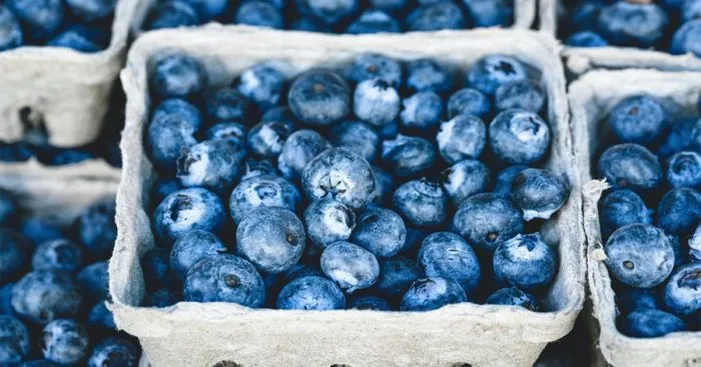
There are certain indicators you can rely on to find out when blueberries are rancid as they become soft and their color deteriorates.
Also, spoiled blueberries may have mold or a very unpleasant acidic smell. (20)
Instead, try looking for the ones that have firm skin and vibrant blue-purplish color with no bad odor.
Storing blueberries:

Fresh blueberries can be crushed easily if you store them on top of each other and the best way is to store them on a flat plate or tray in the fridge.
If you bought frozen blueberries, you can store them in their package in the fridge for up to 1 week.
In case you want to freeze blueberries, you may put them with no more than 2 or three layers on top of each other in a plastic freezing box.
Blueberries can be frozen for up to 6 months without losing their flavor.
References:
(1): Ericaceae (nybg.org)
(2): Carbohydrate Metabolism | Anatomy and Physiology II (lumenlearning.com)
(3): Carbohydrates: How carbs fit into a healthy diet – Mayo Clinic
(4): Amount of Sugar in Blueberries | livestrong
(5): Seasonality – Blueberry.org
(6): Blueberries: Health benefits, facts, and research (medicalnewstoday.com)
(7): Antioxidants in Berries and Other Fruits: Fresh, Dried, and Frozen (webmd.com)
(8): Flavonoids in Deeply Colored Berries Protect People From Disease – Natural Eye Care Blog: News & Research on Vision
(9): Evidence for anti-cancer properties of blueberries: a mini-review – PubMed (nih.gov)
(10): Enhanced Neuronal Activation with Blueberry Supplementation in Mild Cognitive Impairment – PMC (nih.gov)
(11): Blueberry Supplementation Improves Memory in Older Adults – PMC (nih.gov)
(12): Blueberries: An Effective Remedy to Treat UTI – Benefits of Blueberry
(13): Study reveals impressive skin benefits of blueberries (news-medical.net)
(14): Blueberries improve muscle recovery (blueberry.co.nz)
(15): Blueberries Decrease Insulin Resistance | Natural Medicine Journal
(16): 5 Side Effects of Blueberries and What Happens if You Eat Too Many | livestrong
(17): Too much fiber: Symptoms and treatment (medicalnewstoday.com)
(18): Major Side Effects OF Eating Too Many Blueberries – Healthy Food is Not That Healthy (fischerinstitute.com)
(19): Blueberry Allergy, can I be allergic to it? – Los Angeles Allergist (allergylosangeles.com)
(20): How To Tell if Blueberries Are Bad | KitchenSanity
